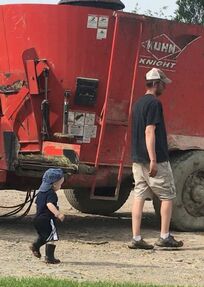CONSERVATION CORNER
A weekly blog for all things conservation
 By: Miranda Neville, Agricultural Resource Specialist Looking at the farmers in my life, some were born in to a seventh generation legacy while others chose to be first generation farmers but they all have one specific thing in common. No matter how long they have been farming they will spend their lives building their operation to create a legacy all their own. If (emphasis on ‘IF’) the day comes that they decide to retire or step back from farming, they want to be sure whoever takes the reigns will love and appreciate it just as they do. Finding someone who will take pride in what they do and who shares a passion for agriculture and their land is a rarity. So how does someone who spent their life cultivating their hopes and dreams (not to mention their life savings) ensure their legacy will live on? Those of us who love farming as a way of life, see the value in what we do every day. We are raising our families on beautiful farmland and teaching our children the value of hard work, dedication, and sacrifice. Unlike previous generations, many farm families are living with unprecedented struggles like increased fuel costs, rising feed and seed costs, and all the other operating expenses while product sales payouts have fluctuated at a steady decline or completely unmatched compared to business inputs. Of course, farmers might truly want their children to continue on the family legacy but the truth is, they know how difficult times are now and just how many sacrifices are having to be made. We can only imagine the future setbacks the next generation will face. One of the key things to consider before encouraging the next generation to take over the farm: Will the longevity of the farm remain profitable enough for them to succeed?
The farming ‘dream’ has been to pass your operation on to your children or grandchildren. The trouble that comes with that scenario is that oftentimes the older generation isn’t as ready to let go as much as they thought and will continue to operate as if they still own it causing strain on the new generation trying to make their own way. It’s important to have all details and roles spelled out when attempting to buy in to the family business. A common way of entering into an agreement like this, is the purchaser will ease in to purchasing the farm piece by piece. They will first purchase cattle, then equipment, then the farm as a whole. When a farmer doesn’t have a member of the family who wants to take over, sometimes a hired hand will express interest. If neither of those scenarios are a possibility, one just remains hopeful that they can garner the interest of someone who has the desire to keep farmland just that. Selling to an outside party can sometimes be easier than selling to a family member. Those situations can be treated more of a business transaction than working with family, where hearts typically lead the process. Having written agreements, contracts, and expectations of responsibilities and rolls on the farm can help with struggles down the road. Speaking to someone who has been involved in a successful farm transition plan can be a great tool to get ideas and decide what kind of approach makes the most sense for your operation and long-term goals. However, it is important to utilize professional resources like the Farm Bureau, PennState Extension, or your local lending branch who all have farm transition plan guides and workshops to make it as legally sound as possible. The hope for all of us in the agricultural industry is to keep farmland in production and minimize the potential for development or industrialization. Preserving the foundation of our country and the integrity of the land is a goal we should all strive for. The Bradford County Conservation District is committed to helping people manage resources wisely. You can visit the Bradford County Conservation District at 200 Lake Rd in Wysox across from the Wysox Fire Hall. Contact us at (570) 485-3144 or visit our web page at www.bccdpa.com.
0 Comments
Leave a Reply. |
AuthorsVarious staff at the Bradford County Conservation District Archives
July 2024
Categories
All
|
|
Bradford County Conservation District
Stoll Natural Resource Center 200 Lake Road, Suite E | Towanda PA 18848 Phone: (570)-485-3144 |
